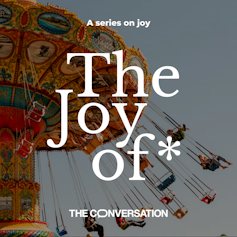ESB Professional/Shutterstock
Despite being a source of constant bad news, the internet is also awash with attempts at countering negativity. A quick search for “inspirational” content yields heaps of speeches, songs and sayings intended to make sense of tough times.
Lists of the latter will typically include things like “Imagination is more important than knowledge”, attributed to Albert Einstein, or the Nicki Minaj lyric, “Everybody dies, but not everybody lives.” Self-help specialists, talk-show hosts, Instagram influencers, and even former US first ladies have been known to pen positive affirmations.
One such list published on the Oprah Daily website during the darker days of the pandemic, featured a quote by the author Maya Angelou, which reminds us that “Nothing can dim the light that shines from within”. Angelou wrote compellingly about her experiences of racism and trauma. What she wrote then can resonate with us even now, wherever we are in the world.

This is an article from The Joy Of*, a series to help those of us in our 20s and 30s find moments of happiness in the everyday. When rents are rising, fun with friends is more infrequent and we’re struggling with work-life balance, daily life can seem hard. But joy doesn’t have to be something saved for big occasions, like weddings or birthdays. These articles from Quarter Life are aimed to help you find joy in the smallest things.
You may be interested in:
I’ve spent years studying happiness – here’s what actually makes for a happier life
The Japanese concept of ikigai: why purpose might be a better goal than happiness
Documenting three good things could improve your mental well-being in work
Hearing or seeing this kind of brief and memorable phrase can help us to get into a more positive mindset. Whether a call to action or a reminder of the values that we hold dear, affirmations can act as a counterbalance to what psychologists refer to as ruminations (repetitive patterns of negative thinking). They do so by getting us to focus on what matters in our lives.
How to tap into positive feelings
Positive emotions can be extremely powerful. Research shows that when we are primed to feel joy, curiosity, gratitude, and other types of positive feelings, we have what psychologists term “broader thought-action repertoires”. This means that we can imagine new possibilities and try out new things. We become more creative and better at solving problems.

Javi_indy/Shutterstock
In 2011, US psychologist Martin Seligman came up with what he called the Perma model of wellbeing. It emphasises five main elements: positive emotion, engagement, relationships, meaning, and achievement.
This model is a helpful tool for understanding the various ways in which we can trigger more positive ways of thinking. These run the gamut from experiencing a positive emotion to being fully absorbed in a challenging task, creating a more loving connection with someone, trying to make sense of a difficult situation, or even simply ticking off jobs on a to-do list.
Positive affirmations have the potential to tap into these various elements of our wellbeing. They can be empowering when we are able to identify with the content of the message, when it has a moral, and when it is memorable.
Some can prompt us to be hopeful and focus on the here-and-now. A common saying in Alcoholics Anonymous addiction recovery circles is “One day at a time”.
Others urge us to become absorbed in an important task (“You’re more likely to act yourself into feeling than feel yourself into action”, from American psychologist Jerome Bruner). Others still can focus on developing positive relationships (“People who are truly strong lift others up. People who are truly powerful bring others together,” from Michelle Obama).
In this way, positive affirmations function like the secular version of religious or spiritual prayer. Research shows that when spoken out loud, prayers can be uplifting, comforting, and create a hopeful attitude. Likewise, speaking or singing an insightful quote or lyric to yourself can be extremely empowering.
Affirmations are often used to help us make sense of disappointments and stresses and keep striving to reach our goals – like a pep talk, only, not from a coach but to ourselves.

Smrm1977/Shutterstock
Research has shown that people who regularly use encouraging self-talk are more likely to perform better, to be satisfied in their jobs, and to want to stay in their positions. This process can be vital for endurance athletes in maintaining stamina.
Ultimately it is an intentional state of mind, which can be helpful in balancing out the challenges we face with these positives we’re acknowledging. Whether we are fighting for social justice, or simply struggling to make ends meet, there are often small glimpses of joy to be found in life’s simple moments. As Aretha Franklin once sang:
You got to spread joy up to the maximum
Bring gloom down to the minimum
And have faith, or pandemonium
Liable to walk upon the scene
So look for quotes and lyrics that inspire you. Store them in a place you can regularly access – on your bedroom wall, in a notebook you keep in your bag. And dig into them when you’re experiencing tough times or when you need prompts for thinking about the bigger picture, the purpose for your life.
Share them with others, either through social media or in person. Take pleasure in being part of a connected and inspired community.
And have a go at reading them out loud. You might be surprised at how it can make you feel more energised or hopeful. It can be exciting to know speaking words of hope and encouragement can help you – and those around you – on your journey.
![]()
Glenn Williams has received funding from the Economic and Social Research Council, Derbyshire Arts Development Group, Derbyshire County Council, and Warwickshire County Council with projects studying psychological wellbeing and mental health. Views expressed here are his own and not those of these funding bodies.











